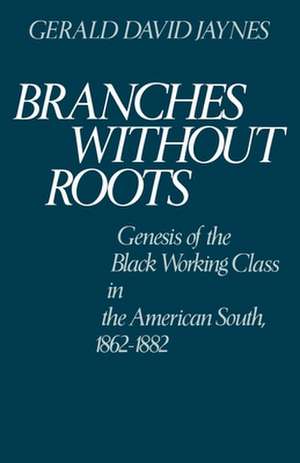Branches Without Roots: Genesis of the Black Working Class in the American South, 1862-1882
Autor Gerald David Jaynesen Limba Engleză Paperback – apr 1989
reexamines the symbiotic nature of the sharecropping system for both planters and workers--how it offered planters a stable work force and offered workers relative freedom, a unified family, and payment for their labor--and analyzes the social and economic effects of sharecropping on the larger
social structure. At the same time, he argues that the collective organization and self-help activities of the freedpeople, the democratic fever incited by black leaders and local agents of the Freedmen's Bureau, and the failure of federal policy were also key factors in the reorganization of the
southern plantation and the entry of blacks into the post war economy.
Preț: 684.82 lei
Preț vechi: 889.37 lei
-23% Nou
Puncte Express: 1027
Preț estimativ în valută:
131.07€ • 136.31$ • 109.68£
131.07€ • 136.31$ • 109.68£
Carte tipărită la comandă
Livrare economică 14-28 martie
Preluare comenzi: 021 569.72.76
Specificații
ISBN-13: 9780195055757
ISBN-10: 0195055756
Pagini: 368
Dimensiuni: 135 x 203 x 20 mm
Greutate: 0.32 kg
Ediția:Reprint
Editura: OXFORD UNIV PR
Locul publicării:New York, United States
ISBN-10: 0195055756
Pagini: 368
Dimensiuni: 135 x 203 x 20 mm
Greutate: 0.32 kg
Ediția:Reprint
Editura: OXFORD UNIV PR
Locul publicării:New York, United States
Descriere
The first comprehensive history of the transition from slavery to sharecropping, this major study draws on thousands of previously untapped sources and statistics to reconstruct the socioeconomic history of the antebellum plantation and the birth of the free black worker. Jaynes thoroughly reexamines the symbiotic nature of the sharecropping system for both planters and workers—how it offered planters a stable work force and offered workers relative freedom, aunified family, and payment for their labor—and analyzes the social and economic effects of sharecropping on the larger social structure. At the same time, he argues that the collective organization and self-help activities of the freedpeople, the democratic fever incited by black leaders and localagents of the Freedmen's Bureau, and the failure of federal policy were also key factors in the reorganization of the southern plantation and the entry of blacks into the post war economy.
Recenzii
[This] exhaustive analysis...shows how alienation of the worker from the soil led to an exploitation that continues to this day, a socioeconomic interpretation of history largely neglected by the historians. Thus the work of this economist and economic historian is a model of social science research....Dr. Jaynes has produced a work which not only illustrates the highest performance and the extraordinary promise of ethnocentric specialization, but represents a major contribution tothe effort to bring the social sciences into closer touch with the reality of a dynamically changing society.
Makes a valuable contribution to understanding the slaves' passage from bondage to the free working class.
If this book did no more than show that the South's underdeveloped capital markets were preconditions for economic failure, it would be a very good book indeed. But Jaynes accomplishes much more....He has read widely in the literature on slavery and emancipation and mined the exhaustive records of the Freedman's Bureau. Economic shrewdness is mixed with common sense. His book thus carries authority....A very good book, maybe a seminal one in the history of the black working classin the South during its early years of freedom. It deserves the widest possible readership.
A highly significant book.
An insightful and original analysis of the transition from slavery to freedom and its effects on the southern economy.
An extraordinary contribution...brilliant in its insightful and sensitive use of literary and statistical evidence, in its application of quantitative methods to clarify rather than obscure, in its reach to analytical models drawn from other cultures, both ancient and modern, and in its shrewd handling of historiographical issues.
A model of social science research...a major contribution toward ending historians' debates over central issues of the Reconstruction.
[An] original and provocative reinterpretation....Those who want to ponder the real economic meaning of freedom for American blacks will find Branches Without Roots indispensable.
Branches Without Roots has greatly enhanced my understanding of what was really happening during the process of Reconstruction. [It] show[s] with rich detail the nature of the material and intellectual environment in which the emancipated slaves were expected to make their way.
A most impressive piece of scholarship. It is really a major step forward in an important debate and will have a big impact on subsequent scholars.
Sophisticated....Integrates social, political, and economic lines of inquiry adeptly and interestingly....Branches Without Roots sparkles with original thoughts about an old topic, and will become a standard in the field.
[An] informative and well-researched monograph.
Makes a valuable contribution to understanding the slaves' passage from bondage to the free working class.
If this book did no more than show that the South's underdeveloped capital markets were preconditions for economic failure, it would be a very good book indeed. But Jaynes accomplishes much more....He has read widely in the literature on slavery and emancipation and mined the exhaustive records of the Freedman's Bureau. Economic shrewdness is mixed with common sense. His book thus carries authority....A very good book, maybe a seminal one in the history of the black working classin the South during its early years of freedom. It deserves the widest possible readership.
A highly significant book.
An insightful and original analysis of the transition from slavery to freedom and its effects on the southern economy.
An extraordinary contribution...brilliant in its insightful and sensitive use of literary and statistical evidence, in its application of quantitative methods to clarify rather than obscure, in its reach to analytical models drawn from other cultures, both ancient and modern, and in its shrewd handling of historiographical issues.
A model of social science research...a major contribution toward ending historians' debates over central issues of the Reconstruction.
[An] original and provocative reinterpretation....Those who want to ponder the real economic meaning of freedom for American blacks will find Branches Without Roots indispensable.
Branches Without Roots has greatly enhanced my understanding of what was really happening during the process of Reconstruction. [It] show[s] with rich detail the nature of the material and intellectual environment in which the emancipated slaves were expected to make their way.
A most impressive piece of scholarship. It is really a major step forward in an important debate and will have a big impact on subsequent scholars.
Sophisticated....Integrates social, political, and economic lines of inquiry adeptly and interestingly....Branches Without Roots sparkles with original thoughts about an old topic, and will become a standard in the field.
[An] informative and well-researched monograph.












